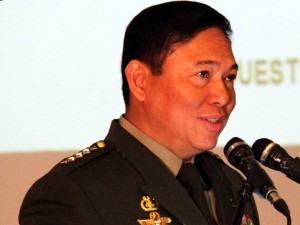LUCENA CITY, Philippines—The Communist Party of the Philippines criticized Armed Forces Chief of Staff General Emmanuel Bautista for belittling the rebel’s six-day unilateral Christmas ceasefire, which he described as so short he wondered why the rebels had even bothered to declare it.
“If the Aquino regime and its armed forces really want a long-term or indefinite ceasefire, then it should push for the resumption of formal peace negotiations with the NDFP (National Democratic Front of the Philippines) on the basis of the foundations built through more than 25 years of negotiations,” the CPP said in a statement released by its Information Bureau on Friday.
The CPP said it knew that the Filipino people had indeed been wishing for a long-lasting peace.
“But they also know that this is impossible under a system that exploits and oppresses the workers, peasants and the downtrodden, and that such can only be achieved by waging mass struggle and armed resistance,” the party said.
After the CPP announced that the New People’s Army rebels would observe a ceasefire from December 24 to 26 and again from December 31 to January 2, Bautista scoffed at two ceasefire periods, saying they were too short and meant nothing in advancing peace efforts.
The top military official said the communist rebels should have declared a permanent cessation of hostilities for the benefit of the Filipino people.
On Friday, President Benigno Aquino declared a 26-day ceasefire with communist rebels starting at midnight of December 20 and lasting until January 15, 2014.
The CPP also assailed what it claimed were continuous military offensives against communist guerrillas engaged in rehabilitation work in typhoon devastated areas, citing a clash between the NPA and government forces on Tuesday in Motiong, Samar.
The CPP claimed that since November 8, all NPA units in Motiong, and in the rest of Samar and all areas ravaged by Supertyphoon “Yolanda”, “have been busy carrying out rehabilitation work by assisting the masses in their effort to resume agricultural production and revitalize the environment through various forms of cooperation and collective work.”
The CPP said that the continuing military offensives areas devastated by Yolanda were a repetition of government’s anti-insurgency campaign in Compostela Valley last year after the destruction left Typhoon Pablo.
The CPP said its declaration of two three-day ceasefires was an expression of solidarity with the people’s traditional holiday observance and was also intended to allow the NPA rebels to concentrate on providing security to those who will join the celebrations of the CPP’s 45th anniversary on December 26 inside the so-called guerrilla zones.
Last Christmas, the NPA rebels observed ceasefire from December 20 to January 15 while the military stopped military operations against communist guerillas from December 16 to January 2, 2013.
The close to four weeks ceasefire was considered he longest Christmas truce between the two sides.
In 2011, both the government and communist rebels observed a 19-day ceasefire to precede the resumption of peace talks. But the on and off peace negotiations have not moved beyond minor agreements.
Last May, the government peace panel announced the termination of the peace negotiations and put the blame on the NDFP with its preconditions and demands.
